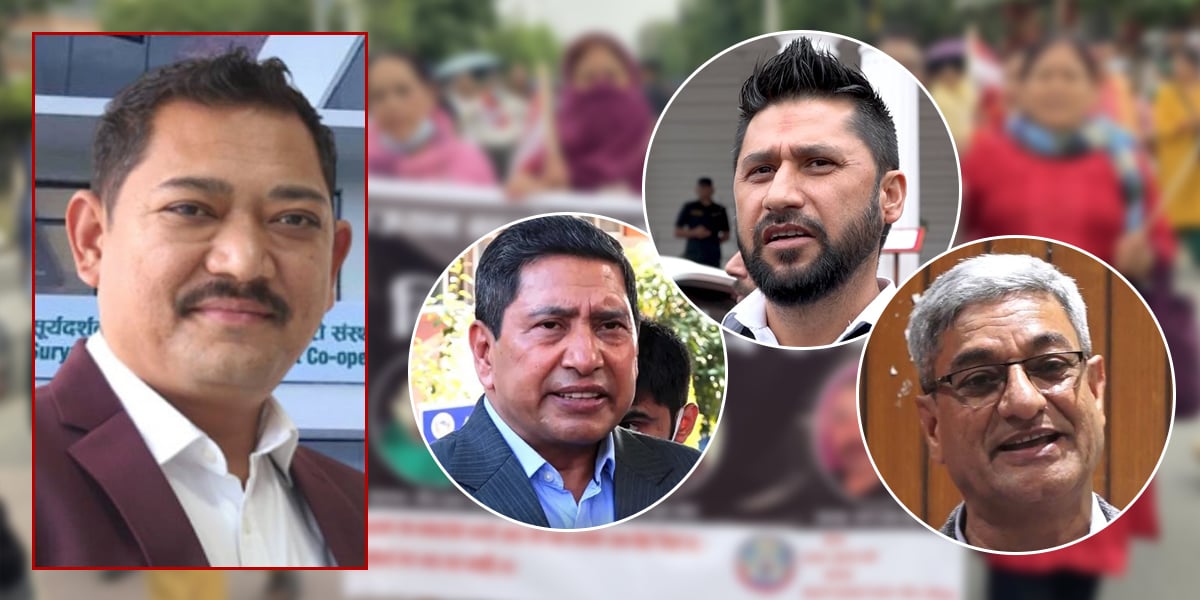KATHMANDU: Gitendra Babu Rai (GB Rai), accused of misappropriating the savings of multiple cooperative societies, has been on the run for approximately a year.
Despite changes in three Home Ministers, Rai has not been apprehended.
The government has information suggesting that Rabi Lamichhane’s former partner is currently hiding in Malaysia, but there has been no arrest.
Current Home Minister Ramesh Lekhak previously stated that the Nepal Police was working diligently to arrest Rai.
However, the opposition Rastriya Swatantra Party (RSP) has accused the government of failing to initiate a proper search for Rai.
During Lamichhane’s tenure as Home Minister, no concrete measures were taken to locate Rai.
A parliamentary investigation committee probing the issue of cooperative fraud has also reported that Rai is in Malaysia.
Hemanta Malla, former DIG of Nepal Police, asserts that the evidence collected by the Cooperative Investigation Committee should enable the government to arrest Rai.
Yet, technical hurdles have reportedly prevented his arrest.
Committee Chairman Surya Thapa noted that the government has promised to secure Rai’s return.
Out of the 50 witnesses who provided statements to the committee, over 30 are linked to GB Rai’s cooperatives.
They claim Rai exploited the public through a network of fraudulent cooperatives across the country.
Evidence of Embezzlement
The committee’s findings indicate GB Rai’s involvement in several problematic cooperatives.
Evidence has surfaced showing that Rai embezzled funds from Swarna Laxmi Multipurpose Cooperative Society in Kathmandu; Suryadarshan Savings and Loan Cooperative Society in Pokhara; and Supreme Savings and Loan Cooperative Society in Butwal.
Additionally, evidence has been found implicating Rai in the embezzlement of funds from Samata Savings and Loan Cooperative Society in Nepalgunj; Sara Chitwan Savings and Loan Cooperative Society in Chitwan; and Sano Paila Savings and Loan Cooperative Society in Birgunj.
Statements from members of these cooperatives allege that Rai misappropriated all the funds and conducted all the business operations.
Kumar Ramtel, believed to be a partner of Rai, along with RSP Chairman Lamichhane and former DIG Chabilal Joshi, have corroborated that Rai is hiding in Malaysia.
Lamichhane further claimed that the government obstructed his efforts to arrest Rai during his tenure as Home Minister.
Bhagishwar Aryal, former director of Suryadarshan Cooperative, expressed frustration over the lack of action against Rai despite evidence of his wrongdoing.
Aryal demanded that the government prioritize Rai’s arrest, stating, “If I have made a mistake, I am ready to face consequences. But Rai, who has caused significant harm, should be caught first.”
Roshni Gurung, a cashier from Supreme Cooperative Butwal, also voiced her distress, stating that her life was ruined due to the actions of Rai and Rabi Lamichhane. She lamented, “Where can I seek justice? I want justice.”
Despite the absence of an extradition treaty between Nepal and Malaysia, there are provisions for arrest and extradition based on diplomatic agreements and political relations.
After paying a bond of 200,000 in Baisakh 2080 BS, Gurung was released, but she remains stigmatized as a cooperative fraudster.
She emphasizes that it is the government’s responsibility to apprehend GB Rai.
Hemanta Malla, former DIG of Nepal Police, asserts that the evidence collected by the Cooperative Investigation Committee should enable the government to arrest Rai.
Malla believes that if the government is committed, Rai can be arrested at any time, emphasizing that political interests should not hinder the police’s efforts.
Home Minister Lekhak maintains that the police are diligently working on the case, stating, “Work will ultimately provide the answers.”
Committee Chairman Surya Thapa reiterated that it is the government’s duty to bring GB Rai back to Nepal, emphasizing that the committee has communicated this responsibility to the authorities.
Malla Questions Government’s Commitment to Arresting GB Rai
Former senior officials of Nepal Police have expressed skepticism about the government’s efforts to arrest GB Rai, suggesting that political interests may be influencing the situation.
Former DIG Malla raised concerns that the government’s commitment to capturing GB Rai may be compromised by political motives.
Malla argues that if there were no political interests at play, arresting GB would pose no problem.
He asserts that if GB is indeed in Malaysia, he could be apprehended through the issuance of a Red Corner Notice by Interpol.
Malla further explains that even if GB has acquired Malaysian citizenship, the process of extradition or obtaining assistance from Malaysia remains viable.
He points out that evidence of GB’s crimes in Nepal could be presented to the Malaysian authorities, even if the crimes are not recognized as such under Malaysian law.
However, Malla criticizes the government for failing to initiate these processes, suggesting that political considerations may be obstructing progress.
“There is no evidence that GB has renounced his Nepali passport in favor of Malaysian citizenship,” Malla noted.
“The lack of action from the government raises suspicions that political interests may be prevailing.”
He added, “Even if GB has given up his Nepali passport, there are other procedures available for his arrest. The government’s reluctance to act suggests a lack of genuine initiative.”
Another former DIG concurs, claiming that the government has created a scenario where GB is portrayed as the sole obstacle to resolving the cooperative fraud issues.
This coalition effectively stalled any significant action against Lamichhane, as all parties agreed to form a committee that would not pursue legal consequences.
This official argues that political biases and influence are determining whether criminals are apprehended.
Despite the absence of an extradition treaty between Nepal and Malaysia, there are provisions for arrest and extradition based on diplomatic agreements and political relations.
The former DIG notes that arrests have been successfully made under political agreements in the past, suggesting that if the government were truly committed, it could collaborate with Malaysia to secure GB’s return.
Former officials suggest that if the Nepalese police cannot be directly involved in GB’s arrest, Malaysia could assist in the investigation, potentially allowing for GB’s return through high-level diplomatic negotiations.
Political Dynamics and GB Rai’s Absence
The case has seen involvement from three different Home Ministers without success in apprehending GB Rai.
Narayankaji Shrestha was previously engaged with the embezzlement case, during which there were reports of Rai’s arrest.
Shrestha claimed that high-level police actions were taken, but GB was not apprehended.
Following Shrestha, Rabi Lamichhane, the Chairman of RSP and former Home Minister, faced pressure to capture Rai.
Accusations were made against Lamichhane for allegedly protecting Rai, despite his assurances that Rai would be caught.
Lamichhane had sought information on Rai through discussions with the Malaysian Home Minister, and later accused the previous government of obstructing the pursuit of Rai.
During a press conference, Lamichhane criticized the previous administration for allegedly driving Rai away.
He questioned why there were obstacles in apprehending Rai, despite efforts to control the situation.
Lamichhane also claimed that he was actively searching for GB Rai and felt his ministerial position was undermined by the government’s inaction.
The Nepali Congress had criticized Lamichhane, accusing him of making grandiose statements without tangible results.
Despite this, Lamichhane insisted in committee statements that the government had impeded efforts to capture Rai.
He called on current Home Minister Lekhak to take decisive action to resolve the issue.
Who is Protecting GB Rai?
The ongoing struggle to apprehend GB Rai has drawn attention to the political dynamics and potential shielding that may be influencing the case.
During Pushpa Kamal Dahal’s tenure as Prime Minister, a parliamentary committee was formed after the Nepali Congress, led by Chief Whip Ramesh Lekhak and General Secretary Gagan Thapa, obstructed the House of Representatives meetings for nearly two months.
Home Minister Lekhak maintains that the police are actively working on the case, asserting that resolving GB’s capture could address up to 80 percent of the cooperative fraud issues.
They claimed there was evidence implicating then Home Minister Lamichhane in the embezzlement of cooperative funds, asserting that Lamichhane should be arrested immediately.
However, Lamichhane was a part of the government coalition, which included both the CPN-UML and the Maoist Center.
Consequently, these parties united to shield him, ensuring that no charges, arrests, or investigations were pursued.
This coalition effectively stalled any significant action against Lamichhane, as all parties agreed to form a committee that would not pursue legal consequences.
Now, with the UML and Nepali Congress in power, and KP Sharma Oli as Prime Minister with Ramesh Lekhak as Home Minister, there has been little progress in addressing the cooperative fraud case.
Despite Lamichhane’s public challenge to arrest GB and bring him to Nepal, the government has yet to take decisive action.
Former Home Ministers and DIGs argue that if the government were genuinely committed, it could arrest GB Rai.
They believe that the arrest is feasible with political will. MP Madhav Sapkota of the opposition Maoist Center also criticizes the government, alleging that it is using GB as a scapegoat to avoid addressing the underlying issues of cooperative fraud.
Ruling party leaders concur that if GB Rai is indeed the principal figure in the cooperative scam, the government should employ diplomatic channels to apprehend him.
Home Minister Lekhak maintains that the police are actively working on the case, asserting that resolving GB’s capture could address up to 80 percent of the cooperative fraud issues.
The situation remains contentious, with accusations of political interference and ineffective governance potentially shielding GB Rai from justice.









Comment